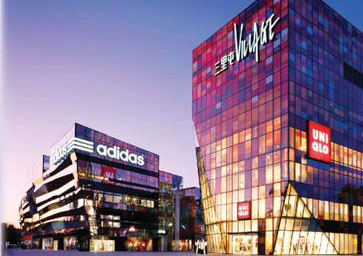管理员

The Sanlitun Village
After living in Beijing for almost four years I am no longer surprised by new shopping centers sprouting up all over the city with names like Raffles City, Viva Mall, Solana, The Place, The Sanlitun Village and San Li Tun SOHO. These mega complexes are constructed almost overnight and all contain practically identical brand-names: Starbucks, Esprit, Zara, Only. Some of these shopping malls, like The Village, are teeming with shoppers, but others, like the shops on Qianmen Pedestrian Street are struggling to survive due to lack of customers and high rent. While taking a stroll through either of these extremes I am always left wondering where China is really headed.
At the Asia-Pacific Economic Cooperation group summit in 2009, Hu Jintao stated, "Our focus in countering the [economic] crisis is to expand domestic demand, especially consumer demand."
China will have to advance domestic demand to maintain economic growth as its export sector continues to face challenges. Recent statistics released by the General Administration of Customs show that in China’s processing trade sector, the growth rate of imports is higher than that of exports. This indicates that as western demand decreases, Chinese companies are importing a greater amount of production materials than the amount of goods they are exporting. Additionally, according to Lian Ping, chief economist of the Communications Bank of China, the demand for Chinese exports is also declining in Asian markets due to the tightening of currency policy affecting domestic demand. Chinese companies need new customers.
Perhaps domestic consumers are the answer to global economic problems. The Economist reports that a 20 percent increase in Chinese consumption could create 25 billion US dollars in exports, leading to over 200,000 American jobs.
A recent report, Analysing China’s Grey Income conducted by Wang Xiaolu of the National Economic Research Institute’s China Reform Foundation, estimates that China’s unreported or “hidden” income was 9.3 trillion yuan in 2008, 30 percent of its 2008 GDP and the average per-capita disposable income of China’s urban households was 32,154 yuan per year in 2008.
But are Chinese consumers spending this money? Retail sales of consumer goods from the first seven months of 2010 were up 18.2 percent from a year earlier according to the National Bureau of Statistics. The money is being spent. Last year, China surpassed the US in domestic car sales and has recently become the world’s biggest beer market.
Chinese consumers are not only spending their money domestically. Last year the number of Chinese visitors to Japan increased by 80 percent. As international travel restrictions on Chinese nationals begin to ease and citizens look to spend their money in countries with lower import taxes on luxury goods, places like Hawaii are eager to bring in Chinese tourists. Linda Lingle, Hawaii’s governor travelled to China four times during her term attempting to encourage relations and secure direct flights between Honolulu and China.
Unfortunately, increasing consumption in China is not a panacea for the woes of the world; a rising consumer society may cause more harm than good. As Keith Bradsher of the New York Times points out, the demands of Chinese consumers are causing an increase in carbon emissions and China recently overtook the US to become the world’s largest energy consumer. While increasing Chinese consumption may be a tempting short-term solution, it may be time for the world to find a means of development other than constructing shopping malls.

Qianmen Shopping Street

A Chinese clothing brand
Images
Sanlitun Village
Qianmen Shopping Street
Prich
